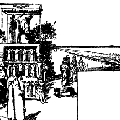26. King Ahasuerus
"This is Ahasuerus which reigned from India even unto Ethiopia, over an hundred and seven and twenty provinces." —ESTHER i.
When King Darius heard tidings of the defeat of his army at Marathon, he was yet more angry with the Athenians, and more determined than ever to make war against Greece. But before he could get ready again, to march against them, he died, and his son Xerxes became King of Persia. This Xerxes was probably the same king of whom we read, in the Book of Esther, and the great feast that he held in his palace, three years after his father's death, was to arrange about carrying on the war against Greece. It was not till five years had passed away, that Xerxes was ready to start for Greece, with his enormous army. First of all he ordered a fleet of ships to anchor near Mount Athos, for he remembered the terrible storm, that had wrecked the first Persian expedition to Greece, at this dangerous spot. He made the men from these ships dig a great trench, wide enough for two ships of war to pass side by side, so there was no more danger of shipwreck at Mount Athos.
When all was ready Xerxes himself, came from his palace at Shushan, to review his troops, and to have bridges built over the Hellespont. This was done by Phœnician and Egyptian engineers. But when the work was finished, there arose a great storm, and the bridges were destroyed. Xerxes was very angry at this accident, and not only did he order the engineers to be beheaded, but commanded that three hundred lashes of the whip, should be inflicted on the waters of the Hellespont. Those who scourged the sea were ordered to address it in these words:—
"O bitter water, our lord lays this punishment upon thee for having done him wrong, who never did wrong to thee. King Xerxes will cross thee whether thou wilt or not, thou treacherous and briny river." Then other engineers set to work and the bridges were made, but they were not finished till the winter had set in.
It was one day, in the early spring, when the sun had but just risen, that the huge army began to cross the bridges, leading them from Asia into Europe. The soldiers and horsemen went over one bridge, while the servants of the army and beasts of burden, went over the other, all crossing under the lash. For this mighty Xerxes was a cruel man. There is a story told of how, just before the crossing of the bridges, an old man came to him and asked him a favour.
"O my lord," said the old man, "I have five sons, and thou art taking them all with thee for this war, which thou makest against the Greeks. Have pity on me, O king, remembering my old age, and release from this service, one of my sons, even the eldest, that he may stay and take care of me." But the king was furious.
"The life of him whom thou lovest above the rest shall be forfeit," he cried in anger, as he ordered the eldest son to be slain at once. One-half of his body was to be placed on the right side of the road, the other on the left, and the army was ordered to pass between the two halves. Such a man, then, was this great Eastern king, who now hoped to win Europe for himself.
On a marble throne erected on the shore, Xerxes watched his army which, according to old stories, took seven days and seven nights to reach the opposite shore.
While the great fleet lay on the quiet blue waters under the lee of the land, the king held a great review of troops, which showed him to have no less than five million of men under him—the largest number, ever known in ancient or modern history.
There were the Persians, wearing coats of mail and trousers, with their wicker shields, large bows, and short spears. There were men from Assyria with helmets of brass, wooden clubs with knots of iron, and short swords. There were Indians clad in cotton; men from the Caspian shores in goat-skin; men from Ethiopia in Lower Egypt in lion-skins and leopard-skins, armed with arrows, and many others.
King Xerxes looked on his splendid army,—on the glittering helmets, on the countless spears, each with a golden pomegranate at the end; at the eight milk-white horses, that drew the sacred chariot of the god Zeus; at the sea covered with his ships, the land covered with his men,—and he counted himself a happy man.
"But afterwards," says the old historian, "afterwards he wept."

